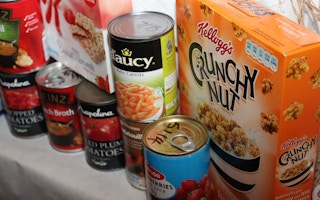With 10 million tonnes of food going to waste in the UK every year, it is often suggested that leftovers should be distributed to food charities to help tackle food poverty. It sounds like a win-win solution – reduce waste and feed hungry people? But a review of the use of surplus food to feed those in need by the Food Research Collaboration group suggests this is not the case.
Not only does recycling food waste from places like supermarkets and cafes not address the roots of food poverty, it is incredibly undignified to give people leftovers. There has been a huge growth in emergency food aid in the UK in the last 10 years mainly through increasing numbers of food banks. In the early 2000s there was one formal food bank, today there are hundreds, with new ones opening every week.
A key danger of charity food aid is the de-politicisation of hunger. As the charity sector mobilises to meet this need, there is less pressure on the government to address the root causes of food poverty, which are essentially income related.
“
Charity provision is a testament of the failure of public authorities to deliver and this should not be not be seen as a permanent substitute for more robust social programmes.
A second major issue with food distributed through charities is that it can’t provide a consistently wholesome and healthy diet, as they are dependent on donations from individuals, and surplus from supermarkets and other food manufacturers. In fact a number of food banks decided to shut down after coming to the realisation that hunger and food poverty is a bigger problem that they couldn’t address and that it was the role of government to do this.
Government failure
The rhetoric of many in government is that food banks and soup kitchens represent the caring face of society. But another way of viewing this is that charity provision is a testament of the failure of public authorities to deliver and this should not be not be seen as a permanent substitute for more robust social programmes.
The sense of shame that is attached to using food banks was illustrated in the recent award-winning film Ken Loach film, I Daniel Blake. It showed the caring side of the food bank volunteers, alongside the shame of approaching and getting emergency food. Once inside, food bank users are constrained in their choice of goods that are available that week.
This is not to place blame on food banks, but to point out that charity provision is not the way to tackle food poverty. The government needs to be held to account.

When it come to tackling food poverty in the long-term, there is no evidence to show that this short-term redistribution of food waste to emergency providers helps. Analysis of data from a 2014 Gallup World Poll found that about 10 per cent of people over the age of 15 were food insecure in the UK, with 4.5 per cent reporting that, at least once, they went without eating for a whole day. What we know is that the numbers approaching food banks are the tip of the iceberg. For every user of a food bank there are between eight to ten others who are living in food poverty.
The other fact that is often overlooked is the roots of this food scarcity and obesity are the same – poverty. In fact there is a large overlap between the two.
Addressing the issue
An inquiry by UK MPs into hunger and food bank use recommended over 70 actions to address food poverty. Motivated by the “scandal” that both food waste and hunger could exist at the same time in the UK, six of the recommendations focused on diverting food surplus from retailers to instead be used by charitable food providers. They wrote: “It is in harvesting from (the surplus or wasted food) that we believe the next big breakthrough will be made in eliminating hunger in this country.”
This does provide short-term, immediate relief to people. But there is no evidence to show it addresses food poverty. Instead it removes the responsibility for tackling hunger from the government and allows them to get away with not addressing the gap between income and the cost of healthy food.
It’s worth remembering that a visit to a food bank is often the result of a benefit sanction or delay. Tackling this is something the government should prioritise, not diverting food from supermarkets to feed people or relying on charity to do so in an ad-hoc way. Meanwhile, redistributing food surplus and waste from supermarkets is no substitute for more structural approaches by companies to reducing food waste.
![]()
Martin Caraher is Professor of Food and Health Policy, City at the University of London. This article was originally published on The Conversation.









